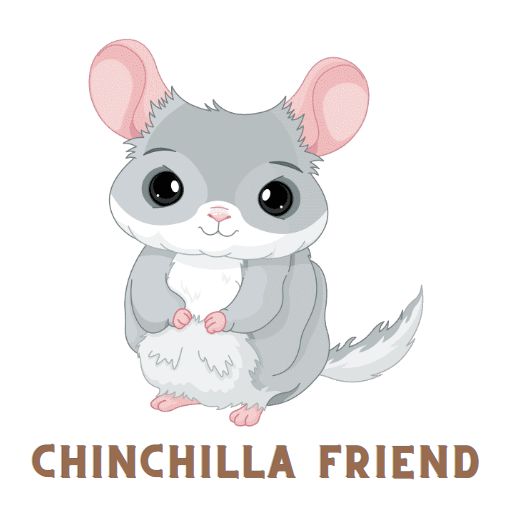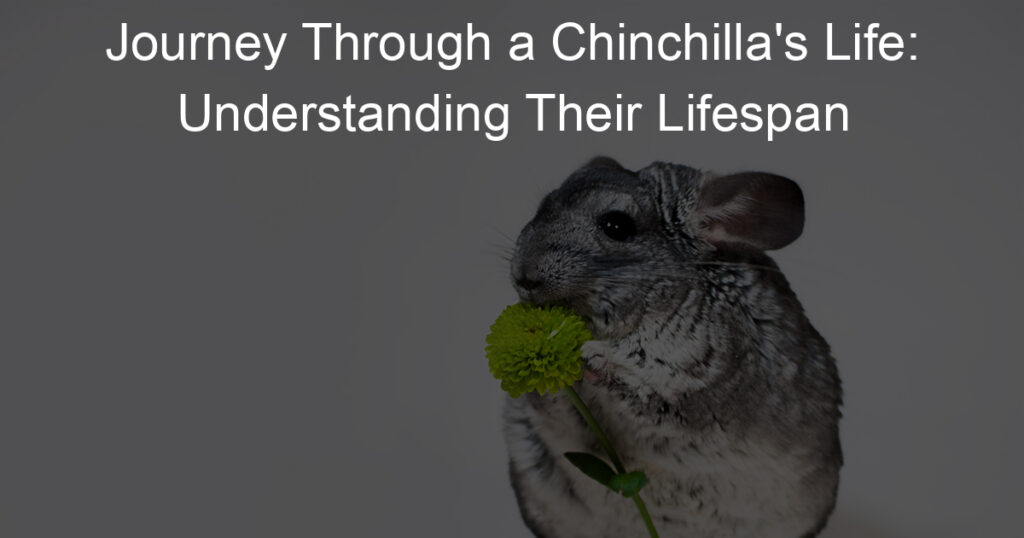Introduction to Chinchilla Lifespan
Chinchillas are fascinating creatures, known for their soft fur and playful nature. One of the most intriguing aspects of these animals is their lifespan. Unlike many small pets, chinchillas can live for a surprisingly long time, making them a long-term commitment for pet owners. In this section, we will delve into understanding the lifespan of a chinchilla and the factors that influence it.
-
- Understanding the lifespan of a Chinchilla
On average, a healthy chinchilla can live between 10 to 20 years in captivity. This is significantly longer than the lifespan of other small pets, such as hamsters or guinea pigs. However, it’s important to note that this lifespan is not guaranteed. Just like with humans, a chinchilla’s lifespan can be influenced by a variety of factors, including its diet, environment, and overall health.
-
- Factors influencing Chinchilla life expectancy
Several factors can influence a chinchilla’s lifespan. These include:
-
-
- Diet: A balanced diet is crucial for a chinchilla’s health and longevity. Chinchillas need a diet high in fiber and low in fat and sugar.
- Environment: Chinchillas thrive in a clean, safe, and stress-free environment. They need plenty of space to move around and exercise.
- Healthcare: Regular veterinary check-ups can help detect and treat potential health issues early, thereby extending a chinchilla’s lifespan.
- Genetics: Just like humans, some chinchillas may be genetically predisposed to live longer than others.
-
By understanding these factors, chinchilla owners can take proactive steps to ensure their pets live a long, healthy life.
Chinchilla Lifespan in Captivity vs. in the Wild
Chinchillas are fascinating creatures, and their lifespan can vary greatly depending on whether they live in captivity or in the wild. Let’s explore this topic in more detail.
Chinchilla Lifespan in Captivity
Chinchillas that are kept as pets or in zoos tend to live longer than their wild counterparts. This is largely due to the controlled environment and regular care they receive.
-
- Chinchilla Care in Captivity
Chinchillas in captivity are provided with a balanced diet, regular veterinary check-ups, and a safe environment free from predators. These factors contribute to their extended lifespan. A well-cared-for chinchilla can live up to 15-20 years in captivity, which is significantly longer than in the wild.
-
- How Captivity Affects Chinchilla Years
While captivity can extend a chinchilla’s lifespan, it’s important to note that the quality of care they receive plays a crucial role. Chinchillas need plenty of exercise and mental stimulation to stay healthy. Without these, they can become stressed or overweight, which can shorten their lifespan. Therefore, it’s essential to provide your chinchilla with a large cage, plenty of toys, and regular interaction.
In conclusion, while chinchillas in captivity can live longer than those in the wild, their care and environment significantly impact their overall health and lifespan. As a chinchilla owner, it’s your responsibility to provide them with the best possible care to ensure they live a long, healthy life.
Chinchilla Lifespan in the Wild
When we think about chinchillas, we often imagine them as cuddly pets in a safe, home environment. However, chinchillas also live in the wild, where their lifespan is influenced by many different factors. Let’s explore the challenges faced by wild chinchillas and how the wild environment affects their lifespan.
-
- Challenges faced by wild Chinchillas
Wild chinchillas face numerous challenges that can shorten their lifespan. These include:
-
-
- Predators: Chinchillas are small creatures, making them an easy target for larger animals. Birds of prey, foxes, and wild cats are among their most common predators.
- Harsh weather conditions: Chinchillas are native to the Andes Mountains, where temperatures can drop drastically. They must adapt to survive these harsh conditions.
- Lack of food: In the wild, chinchillas must forage for their own food. During times of scarcity, they may not find enough to eat, leading to malnutrition.
- Disease: Without access to veterinary care, wild chinchillas are more susceptible to diseases that can reduce their lifespan.
- How the wild environment affects Chinchilla lifespan
-
The wild environment presents a stark contrast to the controlled conditions of captivity. Here’s how it affects a chinchilla’s lifespan:
-
- Stress: The constant threat of predators and the need to find food can cause chronic stress in wild chinchillas, potentially shortening their lifespan.
- Physical exertion: Wild chinchillas are more active than their captive counterparts, leading to more wear and tear on their bodies over time.
- Exposure to elements: Chinchillas in the wild are exposed to varying weather conditions, which can impact their health and lifespan.
In conclusion, while chinchillas are resilient creatures, their lifespan in the wild is significantly influenced by the challenges they face and the harsh conditions they live in. It’s a stark contrast to the controlled environment of captivity, where chinchillas can live up to 20 years with proper care.
Stages of a Chinchilla’s Life
Understanding the different stages in a chinchilla’s life can help you provide the best care for your furry friend. Chinchillas, like humans, go through various phases in their life, each with its unique characteristics and needs. Let’s dive into the different stages of a chinchilla’s life and how to identify them.
-
- Chinchilla Lifespan Stages
There are three main stages in a chinchilla’s life: the juvenile stage, the adult stage, and the senior stage.
-
-
- Juvenile Stage: This stage begins at birth and lasts until the chinchilla is about six months old. During this time, chinchillas are very active and curious, exploring their surroundings and learning about the world.
- Adult Stage: The adult stage starts from six months and lasts until the chinchilla is about ten years old. Adult chinchillas are less active than juveniles but still require plenty of exercise and mental stimulation.
- Senior Stage: The senior stage begins at around ten years old. Senior chinchillas may be less active and require special care to ensure they remain healthy and comfortable.
- How to Identify Different Stages in a Chinchilla’s Life
-
Identifying the stage of life your chinchilla is in can be done by observing their behavior and physical characteristics.
-
- Juvenile Chinchillas: Juveniles are smaller in size and have a high level of energy. They are very curious and love to explore their surroundings.
- Adult Chinchillas: Adults are larger and have a more settled behavior. They still enjoy playtime but are less hyperactive than juveniles.
- Senior Chinchillas: Seniors may show signs of aging such as less activity, weight loss, or changes in their fur. They may also require more frequent health check-ups.
Understanding the stages of a chinchilla’s life is crucial for providing the care they need at each phase. Remember, every chinchilla is unique and may not follow these stages exactly. Always pay attention to your chinchilla’s behavior and physical condition, and consult with a vet if you notice any changes.
Chinchilla Health and Aging Process
Understanding the health and aging process of your Chinchilla is crucial for ensuring its well-being and longevity. This section will delve into common health issues in Chinchillas and how these can affect their lifespan.
Understanding Chinchilla Health
Chinchillas are generally healthy animals, but like all pets, they can be prone to certain health issues. Understanding these common health problems can help you take better care of your Chinchilla and potentially extend its lifespan.
-
- Common health issues in Chinchillas
Chinchillas can suffer from a variety of health issues. Some of the most common include dental problems, respiratory infections, and digestive issues. Dental problems can arise from a lack of proper chewing materials, leading to overgrown teeth. Respiratory infections are often due to poor ventilation or exposure to drafts. Digestive issues can be caused by an improper diet or sudden changes in diet.
-
- How health affects Chinchilla lifespan
The health of a Chinchilla directly impacts its lifespan. A healthy Chinchilla can live up to 15 years in captivity, while those with chronic health issues may have a significantly shorter lifespan. Regular veterinary check-ups, a balanced diet, and a clean, safe living environment can greatly improve a Chinchilla’s health and longevity.
Understanding your Chinchilla’s health and being proactive in its care can significantly improve its quality of life and potentially extend its lifespan. Remember, a happy Chinchilla is a healthy Chinchilla.
Chinchilla Aging Process
Just like humans, chinchillas also experience aging. Understanding the signs of aging and how it affects their life expectancy can help you provide the best care for your chinchilla in their golden years. Let’s delve into these topics.
-
- Signs of Aging in Chinchillas
Chinchillas typically live for 10 to 20 years, and as they age, certain changes become noticeable. These signs of aging include:
-
-
- Decreased Activity: Older chinchillas may not be as active or playful as they once were.
- Weight Loss: Aging chinchillas may lose weight, even if their diet remains the same.
- Changes in Fur: Their fur may lose its shine and become thinner.
- Dental Problems: Dental issues, such as overgrown teeth, can become more common.
- How Aging Affects Chinchilla Life Expectancy
-
The aging process can have a significant impact on a chinchilla’s life expectancy. As chinchillas age, they become more susceptible to health issues. These health problems, if not addressed promptly, can shorten their lifespan.
For instance, dental diseases, common in older chinchillas, can lead to difficulty eating and weight loss. Similarly, decreased activity can lead to obesity, which can further lead to heart diseases. Therefore, it’s crucial to monitor your chinchilla’s health as they age and provide appropriate care to ensure they live a long, healthy life.
| Signs of Aging | Impact on Life Expectancy |
|---|---|
| Decreased Activity | Can lead to obesity and related health issues, potentially shortening life expectancy. |
| Weight Loss | May indicate underlying health issues that can affect life expectancy if not addressed. |
| Changes in Fur | Usually a normal part of aging, but drastic changes can indicate health problems. |
| Dental Problems | Can lead to difficulty eating and weight loss, potentially affecting life expectancy. |
Improving Chinchilla Lifespan: Tips and Tricks
As a chinchilla owner, you want your furry friend to live a long, healthy life. Here are some tips and tricks to help improve your chinchilla’s lifespan.
-
- Proper Chinchilla Care
Proper care is the foundation of a long and healthy life for your chinchilla. This includes providing a clean, spacious cage, plenty of exercise, and mental stimulation. Chinchillas are active and intelligent creatures, so they need toys and activities to keep them engaged. Also, remember that chinchillas are sensitive to heat, so keep their environment cool and well-ventilated.
-
- Ensuring a Healthy Diet for Your Chinchilla
A balanced diet is crucial for your chinchilla’s health. Chinchillas in the wild eat a diet of grasses, leaves, and bark. In captivity, they should be fed a diet of high-quality hay, pellets made specifically for chinchillas, and occasional treats of fresh fruits and vegetables. Avoid feeding your chinchilla foods high in fat or sugar, as these can lead to obesity and other health problems.
-
- Importance of Regular Vet Check-ups
Regular vet check-ups are important for detecting any potential health problems early. Your vet can also provide advice on diet and care, and administer necessary vaccinations. Remember, prevention is better than cure, so don’t wait until your chinchilla is showing signs of illness to take them to the vet.
In conclusion, improving your chinchilla’s lifespan involves proper care, a healthy diet, and regular vet check-ups. By following these tips and tricks, you can help ensure your chinchilla lives a long, happy life.
Case Study: Longest Living Chinchilla
As we delve into the fascinating world of chinchillas, let’s take a moment to explore a remarkable case study. This is the story of the longest living chinchilla, a testament to the potential longevity of these adorable creatures when given the right care and environment.
-
Story of the Longest Living Chinchilla
Meet Mr. Jingles, a chinchilla who defied all odds and lived to the ripe old age of 29 years, setting a record in the process. Born in a small pet shop, Mr. Jingles was adopted by a family who provided him with a spacious cage, a balanced diet, and plenty of exercise.
His owners ensured he had a dust bath twice a week to keep his fur healthy and clean. They also provided him with plenty of chew toys to help maintain his dental health. Regular vet check-ups were a part of his routine, ensuring any potential health issues were caught and addressed early.
Mr. Jingles’ long life can be attributed to the exceptional care he received, which ensured he remained healthy and active throughout his life.
-
Key Takeaways from the Case Study
This case study provides several key insights into how to maximize a chinchilla’s lifespan:
- Proper Housing: A spacious cage that allows for plenty of movement is essential for a chinchilla’s wellbeing.
- Healthy Diet: A balanced diet, rich in hay and supplemented with pellets and occasional treats, contributes to overall health.
- Regular Exercise: Regular out-of-cage exercise helps maintain a chinchilla’s physical health.
- Dental Care: Providing chew toys helps maintain dental health, a critical aspect of a chinchilla’s wellbeing.
- Regular Vet Check-ups: Regular vet visits can catch potential health issues early, increasing the chances of successful treatment.
By following these guidelines, you can significantly improve the chances of your chinchilla living a long, healthy life.
Conclusion: Ensuring a Long, Healthy Life for Your Chinchilla
As we reach the end of our exploration into the lifespan of chinchillas, it’s important to remember the key points we’ve covered. Let’s take a moment to recap and reflect on the information we’ve learned and how it can help us provide the best care for these delightful creatures.
-
- Recap of Chinchilla lifespan information:
Chinchillas are remarkable creatures with a lifespan that can stretch up to 20 years in captivity, significantly longer than most rodents. Their lifespan in the wild is typically shorter due to predators and harsh environmental conditions. The stages of a chinchilla’s life are marked by distinct behaviors and needs, from the playful and exploratory nature of youth to the slower pace of their senior years. Their health and aging process can be influenced by a variety of factors, including diet, exercise, and mental stimulation.
-
- Final thoughts on Chinchilla care and life expectancy:
Ensuring a long, healthy life for your chinchilla involves more than just providing food and shelter. It requires a commitment to understanding their unique needs and behaviors. Regular vet check-ups, a balanced diet, a clean and spacious habitat, and plenty of mental and physical stimulation can significantly improve your chinchilla’s quality of life and potentially extend their lifespan. Remember, the care you provide for your chinchilla today can have a profound impact on their longevity and happiness.
In conclusion, chinchillas are not just pets; they are companions that require our understanding, care, and commitment. By applying the knowledge we’ve gained about their lifespan and the factors that influence it, we can ensure that our furry friends live a long, healthy, and fulfilling life.














